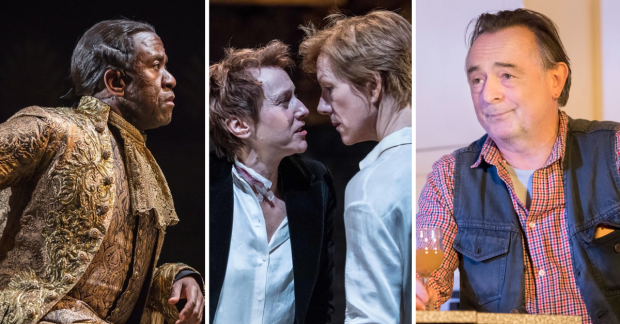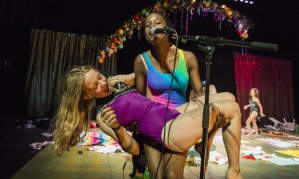2016 proved British theatre is better than ever
Matt Trueman on why this year showed British theatre is at the top of its game

© Marc Brenner (left) and Johan Persson (middle and right)
It’s been one hell of a year. Anyone will tell you that. In geopolitical terms, not the best: a white-knuckle ride on a runaway train. On stage, though, 2016 has been an absolute blinder. This may be Stockholm Syndrome speaking. It may be the sound of someone scrabbling for some sliver of a silver lining. But British theatre is in the best shape I’ve ever known it.
Caveats first. It’s also not. Our theatre culture needs big changes. It needs rebalancing, diversifying and opening up. It must do more within local communities, and encourage participation not just consumption. The way it pays artists warrants serious attention, as do the structures for developing new talent. Touring is in a particularly parlous state. Ticket prices keep ticking upwards. Potential problems are visible on the horizon: creeping commercialism, precarious philanthropy and the need to do more with less.
'British theatre is in the best shape I’ve ever known it'
However, when it comes to what’s actually onstage, there’s a wealth of great, great work. When it came to compiling a top ten list, I found myself spoilt for choice. My notes are next to me now: an A4 sheet scribbled over with show titles. There are 34 in total, all of them startling in their own way and, in another year, any could have ended up in the end of year highlights.
It’s a list that includes the invisible teenage boy kicking his heels through Leo Butler’s Boy and the anxious, nattering octogenarians of Caryl Churchill’s Escaped Alone. It has Ella Hickson’s hurtle through history, Oil, and Lucy Kirkwood’s look at a half-century’s fall-out, The Children. David Ireland’s Cyrpus Avenue wrung dark, manic laughs out of sectarian identities at sea without old rifts to rake over.
Elsewhere, there are old classics delivered beautifully: Dominic Cooke’s tight-as-you-like Ma Rainey’s Black Bottom, Katie Mitchell’s ardent Cleansed, Yael Farber’s vast, almost sculptural staging Les Blancs. Others, remade or retuned. Robert Icke proved Chekhov as our contemporary in a fresh, familiar Uncle Vanya. Michael Longhurst plonked the London Sinfonia into Amadeus. Maria Aberg lit a match under Dr Faustus, and Icke (again) let chance into Mary Stuart – both to extraordinary effect.
'Many of these shows push beyond drama to theatre'
There’s more unusual fare too. No room to recognise Lola Arias’ Minefield, which brought Argentinian and British veterans together, thirty years on, or Andrew Schneider’s split-stage head-slip Youarenowhere – both part of LIFT. Edinburgh had installations too: Belgium’s model apocalypse, Bildraum and FK Alexander’s explosive, exploitative tribute to Judy Garland, (I Could Go on Singing) Over the Rainbow. Queens of Syria at the Young Vic, Situation With Outstretched Arm at BE Festival, How To Win Against History, Ragnar Kjartansson at the Barbican.
Beneath this strength – and the sheer variety of it – is something quite singular: a real sense of theatre. Many of these shows push beyond drama to theatre. They’re live. They’re present. They carry a charge. There is, in British theatre, a willingness to reject assumptions and strip away old conventions, a renewed sense that theatre is a metaphorical space. Artists are disrupting space and shape and structure. The result is often total theatre. Theatre that ties every element together. Theatre that is most truly itself – and all the better for it.













